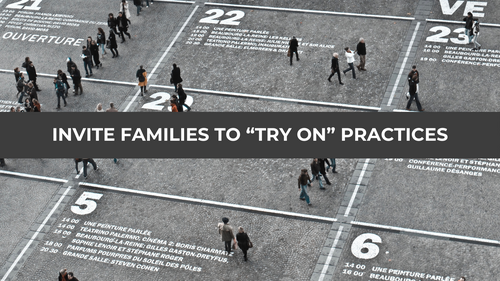Forming Faith through Spiritual Practices, Mentorship, Callings, and Conversation

CLEAR VISION
- Faith is formed in the context of community.
- Faith is a verb that's practiced daily.
- Parents are partners in forming faith.
- The church is like an airport.
- Faith is formed through faith conversations.
- Meet people where they're at in life.
EQUIP PEOPLE
- Embed faith formation into all areas of life..
- Create scripts for helping people form faith.
- Broaden people's web of support.
- Form faith using the seasons of year & life.
- Use milestones to celebrate & grow faith.
- Use daily life as the primary curriculum.
HAVE A PLAN
- Describe what everyday discipleship looks like.
- Build teams that model everyday faith.
- List your next faithful steps who's leading them.
- Update your scorecard; track your results.
Forming a lifelong Christian faith is a profound journey that combines spiritual practices, the guidance of faith mentors, a clear understanding of one's calling, and open dialogue with others about their faith journeys. In this article, we explore the multifaceted process that sustains and deepens one's Christian faith over a lifetime.
1 | Spiritual Practices
At the core of a lifelong Christian faith are spiritual practices. These rituals provide a foundation for faith development, nurturing a deep connection with God. Common practices include daily prayer, scripture reading, meditation, and attending church services. Engaging in these practices consistently strengthens one's spiritual bond and helps navigate life's challenges.
2 | A Web of Faith Mentors
Mentorship is pivotal in the formation of a lifelong Christian faith. Having a web of faith mentors – experienced Christians who offer guidance, wisdom, and support – is invaluable. These mentors can include parents, pastors, older friends, or spiritual leaders. They provide insight, answer questions, and model a life of faith. By learning from their experiences, individuals can grow in their own faith journey.
3 | Clarity About One's Calling
Understanding one's calling within the Christian faith is a transformative step. This involves discerning how God wants them to serve in the world. Whether it's through mission work, leadership in the church, or any other calling, clarity about one's purpose within the faith deepens the connection to God. Reflecting on one's talents, passions, and prayerful guidance can aid in discovering this calling.
4 | Talking with Others about Their Faith Journeys
Conversations about faith are enlightening and enriching. Engaging with others about their faith journeys offers fresh perspectives and insights. It allows individuals to learn from different experiences, adapt their beliefs, and grow in their own faith. These conversations create a sense of community and remind individuals that they are not alone in their spiritual journey.
5 | Navigating Doubt and Questions
A lifelong Christian faith is not devoid of doubt or questions. In fact, it's through grappling with these uncertainties that faith can mature. Honest discussions with mentors and peers about doubts can lead to a stronger, more resilient faith. God can use these moments of uncertainty to reveal deeper truths and strengthen one's relationship with God.
6 | Continual Growth and Adaptation
A key aspect of forming a lifelong Christian faith is the ability to adapt and grow with changing circumstances. Life brings various challenges, and faith needs to evolve to address them. This requires an open heart and a willingness to continuously seek God's guidance through prayer, scripture, and mentorship.
Forming a lifelong Christian faith is a dynamic, ongoing process that weaves together spiritual practices, the wisdom of mentors, clarity about one's calling, and meaningful conversations with others. It is a journey filled with moments of inspiration and doubt, but ultimately, it is a path toward a deeper connection with God and a life filled with purpose and meaning. By nurturing these essential elements, individuals can navigate the complexities of life while remaining grounded in their Christian faith.
1 | Spiritual Practices
At the core of a lifelong Christian faith are spiritual practices. These rituals provide a foundation for faith development, nurturing a deep connection with God. Common practices include daily prayer, scripture reading, meditation, and attending church services. Engaging in these practices consistently strengthens one's spiritual bond and helps navigate life's challenges.
2 | A Web of Faith Mentors
Mentorship is pivotal in the formation of a lifelong Christian faith. Having a web of faith mentors – experienced Christians who offer guidance, wisdom, and support – is invaluable. These mentors can include parents, pastors, older friends, or spiritual leaders. They provide insight, answer questions, and model a life of faith. By learning from their experiences, individuals can grow in their own faith journey.
3 | Clarity About One's Calling
Understanding one's calling within the Christian faith is a transformative step. This involves discerning how God wants them to serve in the world. Whether it's through mission work, leadership in the church, or any other calling, clarity about one's purpose within the faith deepens the connection to God. Reflecting on one's talents, passions, and prayerful guidance can aid in discovering this calling.
4 | Talking with Others about Their Faith Journeys
Conversations about faith are enlightening and enriching. Engaging with others about their faith journeys offers fresh perspectives and insights. It allows individuals to learn from different experiences, adapt their beliefs, and grow in their own faith. These conversations create a sense of community and remind individuals that they are not alone in their spiritual journey.
5 | Navigating Doubt and Questions
A lifelong Christian faith is not devoid of doubt or questions. In fact, it's through grappling with these uncertainties that faith can mature. Honest discussions with mentors and peers about doubts can lead to a stronger, more resilient faith. God can use these moments of uncertainty to reveal deeper truths and strengthen one's relationship with God.
6 | Continual Growth and Adaptation
A key aspect of forming a lifelong Christian faith is the ability to adapt and grow with changing circumstances. Life brings various challenges, and faith needs to evolve to address them. This requires an open heart and a willingness to continuously seek God's guidance through prayer, scripture, and mentorship.
Forming a lifelong Christian faith is a dynamic, ongoing process that weaves together spiritual practices, the wisdom of mentors, clarity about one's calling, and meaningful conversations with others. It is a journey filled with moments of inspiration and doubt, but ultimately, it is a path toward a deeper connection with God and a life filled with purpose and meaning. By nurturing these essential elements, individuals can navigate the complexities of life while remaining grounded in their Christian faith.
SAMPLE FAITH FORMATION BLUEPRINT
Introduction
The Faith Formation Blueprint provides an overview of how our faith community intends to support and equip individuals in becoming lifelong followers of Christ and to help households practice faith every day, everywhere and with everyone living into our tagline, “Where faith and life connect”. The blueprint underscores that Christian faith formation is a life-long process that takes place in the home, the congregation and in the community. It also assumes that everyone is at a different place in their life and faith journey. Our blueprint engages five principles, five faith practices, and eight pathways of lifelong faith formation—faith for every age and every stage.
Five Principles for Faith Formation
The Faith Formation Blueprint provides an overview of how our faith community intends to support and equip individuals in becoming lifelong followers of Christ and to help households practice faith every day, everywhere and with everyone living into our tagline, “Where faith and life connect”. The blueprint underscores that Christian faith formation is a life-long process that takes place in the home, the congregation and in the community. It also assumes that everyone is at a different place in their life and faith journey. Our blueprint engages five principles, five faith practices, and eight pathways of lifelong faith formation—faith for every age and every stage.
Five Principles for Faith Formation
- Faith is formed by the power of the Holy Spirit through personal, trusted relationships, often in our own homes.
- The Church is a living partnership between the ministry of the congregation and the ministry of the home.
- Where Christ is present in faith, the home is church, too.
- Faith is caught more than it is taught.
- If we want spiritual children and youth, we need spiritual adults/parents.
FAITH PRACTICES IN ACTION
1 | Gathering in Grace
Caring conversations express an interest in others, their hurts, their joys, their concerns and dreams, their values and faith. Caring conversation requires time to be available to listen and to speak. Congregations are encouraged to help families identify the holy ground of their lives where precious, caring conversations take place and where lives are strengthened and nurtured by the love and mercy of God through the support, guidance and genuine interest of others.
2 | Growing in Faith
A devotional life is a way to practice the presence of God through the word of God. Many families and individuals need help with the language of prayer and faith in daily life. A devotional life is more of a consciousness and way of life than a formula to accomplish a certain task. Family devotions connect the generations with faith, hope and love in a world that speaks and operates on a different basis than the gospel of Jesus Christ.
Giving Generously Generosity is a response to the goodness and generous nature of God. Learning to give our time, our unique gifts, and our money we see how this is an act of stewarding what God has already given to us. Giving generously is a hallmark of a growing Christian and a growing church.
3 | Going to Serve
Service to one’s neighbor is the calling we all are given through the life and message of Jesus Christ. For a Christian, service is motivated out of love we have first received from God. Service communicates that love to others and is a concrete expression of one’s own faith and values. Family service projects have been shown to be a vital way to pass on faith from generation to generation. Children and youth are greatly influenced by what they see in the lives of others, especially parents and other family members.
4 | Gratefully Sharing ‘God Sightings’
Gratitude directly impacts the deep joy that grows in us as we learn to trust God’s faithfulness more and more. An essential component to seeing God’s faithfulness is the ability to see God in action both in our past and in our present. God promises that when we seek God, we will find God. (Jer. 29:13). Furthermore, God promises that we will find him. In essence, we will find what we are looking for. When we look for God’s action our lives we are better equipped to help other’s see God’s action in their lives. As we see God’s faithfulness to us, we become deeply and profoundly grateful and we are filled with an unspeakable joy. God’s unspeakable joy in our lives changed everything.
Caring conversations express an interest in others, their hurts, their joys, their concerns and dreams, their values and faith. Caring conversation requires time to be available to listen and to speak. Congregations are encouraged to help families identify the holy ground of their lives where precious, caring conversations take place and where lives are strengthened and nurtured by the love and mercy of God through the support, guidance and genuine interest of others.
2 | Growing in Faith
A devotional life is a way to practice the presence of God through the word of God. Many families and individuals need help with the language of prayer and faith in daily life. A devotional life is more of a consciousness and way of life than a formula to accomplish a certain task. Family devotions connect the generations with faith, hope and love in a world that speaks and operates on a different basis than the gospel of Jesus Christ.
Giving Generously Generosity is a response to the goodness and generous nature of God. Learning to give our time, our unique gifts, and our money we see how this is an act of stewarding what God has already given to us. Giving generously is a hallmark of a growing Christian and a growing church.
3 | Going to Serve
Service to one’s neighbor is the calling we all are given through the life and message of Jesus Christ. For a Christian, service is motivated out of love we have first received from God. Service communicates that love to others and is a concrete expression of one’s own faith and values. Family service projects have been shown to be a vital way to pass on faith from generation to generation. Children and youth are greatly influenced by what they see in the lives of others, especially parents and other family members.
4 | Gratefully Sharing ‘God Sightings’
Gratitude directly impacts the deep joy that grows in us as we learn to trust God’s faithfulness more and more. An essential component to seeing God’s faithfulness is the ability to see God in action both in our past and in our present. God promises that when we seek God, we will find God. (Jer. 29:13). Furthermore, God promises that we will find him. In essence, we will find what we are looking for. When we look for God’s action our lives we are better equipped to help other’s see God’s action in their lives. As we see God’s faithfulness to us, we become deeply and profoundly grateful and we are filled with an unspeakable joy. God’s unspeakable joy in our lives changed everything.
8 PATHWAYS FOR FORMING FAITH
1 | WORSHIP
2 | LARGE GROUP CONGREGATIONAL SETTINGS
3 | SMALL GROUP CONGREGATIONAL SETTINGS
4 | HOUSEHOLD SETTINGS
- Integrate Milestones Celebrations into worship as meaningful, memorable moments marked with the cross of Christ for people birth until death.
- Introduce people to the Good News, the biblical narrative and key concepts found in the Bible.
- Assist people with learning how to share their story and God’s story with others.
2 | LARGE GROUP CONGREGATIONAL SETTINGS
- Demonstrate caring conversations at congregational gatherings.
- Provide learning forums on the Old and New Testament, and Church history.
3 | SMALL GROUP CONGREGATIONAL SETTINGS
- Engage faith community participants in small group Bible Studies throughout the year.
- Engage faith community participants in small group book discussions on leadership, spiritual disciplines, and other faith forming subjects.
- Engage faith community participants in quarterly small group book or movie discussions based on current offerings.
4 | HOUSEHOLD SETTINGS
- Provide Taking Faith Home, Home Huddles (Faithink), and Whirl weekly.
- Provide households with “in home” Four Key faith formation training.
- Provide webinars and Facebook parties to equip households with integrating “Living Well” faith practice in their daily life.
5 | SPIRITUAL DIRECTION & MENTORING
6 | PRINT & FAITH FORMATION RESOURCE
7 | SELF-DIRECTED ONLINE RESOURCES
8 | TRIPS, LIFE EXPERIENCES and LIFE TRANSITIONS
- Provide opportunities to meet with a certified spiritual director
- Provide opportunities to participate in small group spiritual direction
- Encourage people to attend a two-year Lay School of Theology that involves reading, blogging and mentoring
6 | PRINT & FAITH FORMATION RESOURCE
- Provide a beginner’s level Faith Formation Reading Plan and review process
- Provide an intermediate level Faith Formation Reading Plan and review process
- Provide an advanced level Faith Formation Reading Plan and review process
7 | SELF-DIRECTED ONLINE RESOURCES
- Introduce households to vibrantfaithathome.org resource
- Introduce households to faithformationlearningexchange.net
- Introduce people to recommended blogs and Facebook pages
- Introduce people to online resources provided by seminaries and the ELCA
- Introduce people to webinars and online faith formation training events
8 | TRIPS, LIFE EXPERIENCES and LIFE TRANSITIONS
- Offer faith-based support groups for those experiencing grief, divorce, loss and life transitions
- Offer short-term experiences for people to explore vocation, service and justice issues
- Offer camping ministry opportunities for children, youth, adults, and families (family camp)
PLAN 1 | Cast a vision for lifelong faith
IDEAS FOR NEXT STEPS
- Review the Exemplary Youth Ministry Study information on indicators of a maturing Christian faith.
- Review sample Faith Formation Blueprint documents from other congregations.
- Interview pastors and faith formation leaders known for exemplary faith practices.
- List outcomes and behaviors describing what living, loving, and leading like Jesus looks like.
- Create a first draft of a vision for lifelong faith; share with leaders.
- Orient pastors, program staff, teachers, faith mentors, and parents about our vision for lifelong faith.
- Schedule a 4-week sermon series on "Forming Faith in Daily Life" that addresses WHAT spiritual vitality is, WHO nurtures it, WHERE it happens, and HOW it is discussed and practiced.
QUESTIONS
- When and where do people share faith stories & practices?
- How often are stories of faith shared during worship?
- What role do parents play in faith formation?
- What do you want to see happen in people's homes?
- What expectations do you communicate about forming faith?
- Do your leaders see themselves as spiritual leaders?
- Do programs play too big a role in forming faith?
PLAN 2 | Share people's faith stories
IDEAS FOR NEXT STEPS
- Create plan to meet with faith mentors (parents, grandparents, teachers, mentors) to talk abou spiritual practices.
- Capture stories based on the 13 Indicators of Maturing Faith.
- Capture 6 stories about home-based family faith practices.
- Create a schedule for capturing and sharing faith stories.
- Capture faith stories related to each season of the church year.
- Decide where we'll keep faith stories for future use.
QUESTIONS
- Who's faith stories have been shared this year?
- Where do you share faith stories and practices?
- How often do you share home-based faith stories?
- What prevents you from sharing stories more often?
- How often do you share people's callings in life?
- What practices would you like to embed this year?
PLAN 3 | Introduce daily faith practices
IDEAS FOR NEXT STEPS
- Provide Taking Faith Home resource for households to use during mealtimes, bedtimes, and family gatherings.
- Invite parents and grandparents to read stories from the Spark Bible with their children/grand children (in person/online).
- Create a 4-6 week sermon series on spiritual practices with demonstrations and exercises to be "tried on" every week.
- Create a series of scheduled Facebook and Instagram postings that describe people's spiritual wellsprings.
- Introduce a Group Gratitude journal at church or online.
- Sponsor quarterly book discussions related to spiritual practices.
- Invite members to read the scripture lesson in preparation for next week's sermon.
QUESTIONS
- Which spiritual practices would you like to see members Try on?
- When do you share these hopes with your congregation?
- When and where do you share stories about people’s practices?
- What practices do staff/elected leaders model/embed?
- Which spiritual practices need further reinforcing?
- Which faith practices could you introduce via short videos
PLAN 4 | Use digital space to form faith
IDEAS FOR NEXT STEPS
- Post Taking Faith Home resources for all households on Facebook and Instagram; create monthly list of scheduled postings.
- Share a Forming Faith in Daily Life video once a week via Facebook.
- Post a recent podcast related to personal and spiritual growth on Facebook.
- Recruit 5 or more photographers to capture spiritually-oriented images of individuals. and families forming faith.
- Highlight online courses members could engage in to learn about the Bible, church history, theology and spiritual practices (via seminaries, The Great Courses, and Select Learning).
QUESTIONS
- How is faith formation reinforced on your website?
- Which social media sites do you post faith forming content?
- Who posts content on your sites? Who comments on it?
- When and where do you share stories about people’s practices?
- Do staff and elected leaders regularly post/comment online?
- What would be your next faithful step?
20 TIPS in 50 MINUTES
1 | Take notes on the tips.
2 | Share notes on the tips.
3 | List action steps.
4 | Prioritize action steps.
5 | Build on what's working.

TIPS 1-5
1 | It starts with you
2 | Start with your setting
3 | List the opportunities
4 | Try. Fail. Learn. Retry

TIP 6
1 | Daily news
2 | Unpack your day
3 | Music | TV
4 | Connect faith to life

TIP 7
1 | Lectionary reading
2 | Question of the week
3 | God sightings
4 | Note service & callings

TIP 8
1 | Worship; videos
2 | Leadership meetings
3 | Member crowdsourcing
4 | Note service & callings

TIP 9
1 | Family celebrations
2 | Annual meetings
3 | Next steps in faith
4 | Living into callings

TIP 10
1 | Picture of the the day
2 | iPhone apps; Youtube
3 | Devotional text
4 | Crowdsourcing

TIP 11
1 | Family servant events
2 | Adopt a local project
3 | Debriefing resources
4 | Members in mission

TIP 12
1 | Naming one's callings
2 | Naming our superpowers
3 | Share callings stories
4 | Developing your callings

TIP 13
1 | Navigating new roles
2 | Discerning next steps
3 | Learning to let go, say no
4 | Learn decision-making

TIP 14
1 | How do you feel?
2 | What would you do?
3 | I've noticed . . .
4 | I'm curious . . .

TIP 15
1 | Listen to music/lyrics
2 | Podcasts | short videos
3 | Instagram reels
4 | Sermon sound bytes

TIP 16
1 | Inquire like a coach
2 | Explore options
3 | What does your gut say?
4 | Faith and values?

TIP 17
1 | Learn from failures
2 | Try short/simple pilots.
3 | Go "undercover"
4 | Refine your approach

TIP 18
1 | Dinner gatherings
2 | Parent newsletter
3 | Pilot parenting resources
4 | Parent Zooms

TIP 19
1 | Spiritual types
2 | Sprints
3 | Back up plan
4 | Take a break

TIP 20
1 | Do less . . . go deeper
2 | Create 30-45 day sprints
3 | Identify inner circle
4 | Name what's working

Ideas | Steps
1 | Share
2 | Prioritize
3 | Pilot
4 | Plan

WHAT NOW?
1 | What's stirring?
2 | What's strategic?
3 | Where's the energy?
4 | Who can help?
5 | What assets are needed?

RETHINK DISCIPLESHIP Videos Worth Watching
Website links to support your planning
- Post on your website: Bible Gateway
- Post on your website: Center for Action and Contemplation (meditations and podcast)
- Post on your website: Building Faith (resources for faith formation leaders)
- Post on your website: Moravian Daily Text
- GenOn Ministrie
- Glo Bible
- Kerygma Program
- Lifelong Faith Associates
- Logos Bible Software
- Olive Tree (Bible app)
- Pew Research Center
- Project Twelve (helping men grow spiritually)
- Select Learning
- Spirit & Truth Publishing
- UMC Discipleship
- Vibrant Faith Ministries (forming faith in daily life)
- The Work of the People (videos for learning & transformation)
- Working Preacher
- YouVersion (devotional resources)
Recommended DISCIPLESHIP Books
- A Royal "Waste" of Time
- A Spirituality of Living
- Being the Presence of Christ
- The Beloved Community
- Called by God to Serve
- Calling All Years Good
- Callings
- The Caring Congregation
- Celebration of Disciple
- Common Prayer: A Liturgy for Ordinary Radicals
- The Common Rule
- Connecting Church and Home
- Creating a Life With God
- Creating Holy Spaces
- Daily Texts (Moravian)
- Engage Every Family
- Everything is Sacred
- Faith Formation 4.0
- Faith Formation in a Secular Age
- Faith Formation With a New Generation
- Faith Forming Faith
- Faithful Families
- Families and Faith
- Families at the Center of Faith Formation
- Family-Based Youth Ministry
- Grateful
- Holding Your Family Together
- Holy Conversation
- Holy Work with Children
- How to Read the Bible Book by Book
- How to Read the Bible for All its Worth
- The Jesus-centered Life
- Jesus-Centered Youth Ministry
- Family-Based Youth Ministry
- Grateful
- Holding Your Family Together
- Holy Conversation
- Holy Work with Children
- How to Read the Bible Book by Book
- How to Read the Bible for All its Worth
- The Jesus-centered Life
- Jesus-Centered Youth Ministry
- Learning to Pray Again
- Liturgy of the Ordinary
- Longing for God
- Making Sense of the Bible
- Making Sense of Scripture
- Power Surge
- The Practicing Congregation
- Recalibrate: A New Measure for Family Ministry
- Rest is Resistance
- Sacred Pathways
- Sacred Stories, Spiritual Tribes
- Saying No to Say Yes
- The Scattering
- The Seasons of Adult Faith Formation
- Shaping Spiritual Leaders
- So Tell Me a Story
- Souls in Transition
- The Soul of Discernment
- The Spirit and Culture of Youth Ministry
- Spiritual Disciplines Handbook
- Sticky Faith
- The Sticky Faith Guide for Your Family
- The Stories We Live
- Transformational discipleship
- Transforming Worship
- Traveling Mercies
- We Make the Road By Walking
- Worship Frames
- Worship Matters
- You Are What You Love